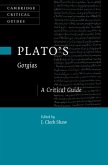Plato, an early Greek philosopher, composed "Gorgias" as a Socratic conversation about 380 BC. It is named after the dialogue's main character, the famous Greek sophist Gorgias. The discussion examines a number of philosophical and rhetorical subjects, such as the essence of rhetoric, the search of knowledge, and the effectiveness of persuasion. The dialogue starts with Socrates conversing with Gorgias, who is renowned for his rhetorical prowess. Gorgias is questioned by Socrates over the moral implications of eloquence and its genuine nature. Through their conversation, Socrates refutes Gorgias' beliefs and makes the case that genuine wisdom and virtue are more important than mere persuasion. The conversation then moves on to further participants, including Callicles, a well-known Athenian politician, and Polus, another young sophist. The essence of justice, morality, and the use of power are further explored in these conversations. The "Gorgias" by Plato addresses important issues on the morality and function of persuasion. It criticizes the dishonest use of language for self-advancement and promotes the quest for truth and the development of virtue. The fact that "Gorgias" is still a well-known work in the Platonic corpus shows how engaged Plato is with sophistry and how crucial ethical reasoning is to the search for the truth.
Dieser Download kann aus rechtlichen Gründen nur mit Rechnungsadresse in A, D ausgeliefert werden.









